There’s an old saying that says, “Do what you love, and you’ll never work a day in your life.”
It’s a nice sentiment, but it’s also completely wrong.
When you do what you love, you’ll work hard at it every day! That’s because your work is fun, exciting, and rewarding, and you’ll probably want to be the best you can be at it.
For many, this hard work begins in culinary school. Yes, culinary school is a challenge! But it’s a challenge that thousands upon thousands of students have been able to meet. And you can too.
The Truth About Culinary School
Culinary school is certainly not a walk in the park, and it’s not supposed to be. Culinary school takes commitment and perseverance. But is culinary school hard? The truth is that many find the challenge to be exciting and fun, keeping them on their toes!
Depending on a student’s experience level, they may be starting their program with very little cooking knowledge or terminology to rely on. That’s okay—culinary students aren’t required to be experts before they begin. But it does mean that beginners will have more to learn than more experienced students.
That being said, even the experienced students won’t fly through school without the need for growth. They may have bad habits to unlearn, or there may be large gaps in their knowledge.
In short—culinary school can challenge students to learn new terminology, new techniques, and some of the science behind those techniques. It can be technical and complex, requiring students to focus on both minute detail and the larger picture all at once.
But at Auguste Escoffier School of Culinary Arts, each course is designed with intention. Beginning with Culinary Foundations, culinary arts students can build the bedrock of their skills, which they can then hone and improve as they add to their culinary toolbox with more advanced techniques, world cuisines, and foodservice industry training.
It’s a fast-paced but purposeful curriculum that guides students through one step at a time.
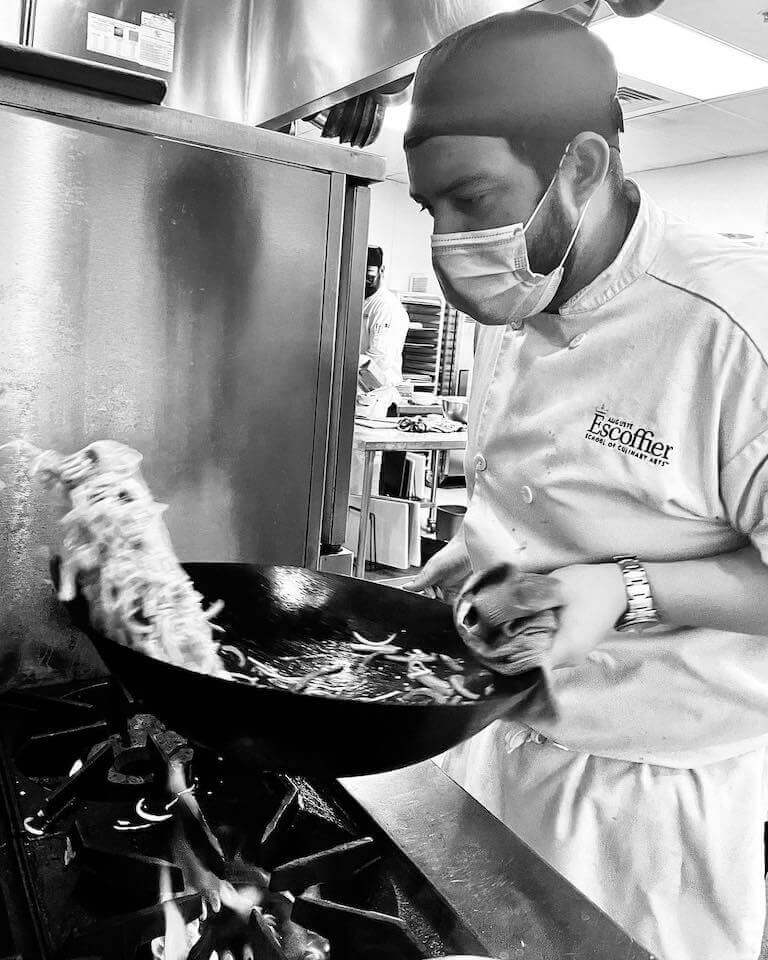
How Escoffier Can Set Students Up for Success
While culinary school is challenging, Escoffier is committed to helping students navigate it smoothly. That’s why we’ve implemented programs and platforms that can make it easier for students to get the support they need while they progress through their coursework.
Online Culinary School Can Make Education More Accessible
Students can only find success in culinary school if they have the option to attend. And for many, quitting their jobs and attending school on-campus Monday through Friday isn’t feasible.
That’s why Escoffier is the only U.S. accredited institution offering 100% online diplomas and degrees nationwide with culinary classes and hands-on industry externships.** These programs are designed to work with your schedule. As long as you meet program deadlines, you can watch video lessons and complete your assignments at any time, day or night.
There are live lectures as well, with ample opportunities for interacting with classmates. Students submit photos and a written summary to their Chef Instructors, assessing their process and sharing tasting notes using the Escoffier flavor wheel. Then, instructors send back personalized video feedback based on the student’s summary and photos.
This system can give more aspiring cooks and chefs than ever before the opportunity to benefit from a culinary education!
Success Coaches Can Offer One-on-One Support
The culinary world would be terribly monotonous if everyone in it brought the same perspective. At Escoffier, we love having students from different countries, different experience levels, different socioeconomic backgrounds, and different ages (or stages in their careers).
This level of diversity also means that some students may need extra support. Students returning to school after a long absence, military veterans, single parents… a helping hand can provide the boost that a student needs to see them through to graduation day.
At Escoffier, all online students will be assigned a Success Coach who can offer suggestions or guidance to help students meet the challenges they face during school. For example, your Success Coach could help you connect with resources in your area. Coaches have helped students find financial help and even guided them through keeping up with their academics during unexpected health or personal issues.
Success Coaches reach out to each student to make that initial connection and share their contact information. And if the student appears to be struggling, coaches can get in touch and see what they can do to help. Likewise, students can reach out to their Success Coaches with questions or concerns throughout their program. On-campus enrollees also have student success support to help them on their journeys.
“I struggled with school in the past for years but with the help of Career Services and my Success Coaches, I graduated on time. I put a goal in place of getting 95% or higher in each of my baking courses and I did exactly that.”*
Kellie Trimble, Online Pastry Arts Graduate
Chef Instructors Can Provide Valuable Guidance
Our Chef Instructors are the greatest asset to our culinary school. It’s through their industry experience and technical expertise that we’re able to share so much knowledge with our students. They’ve been in your shoes, whether you’ve never held a knife before or whether you’re already an accomplished chef. So they’re an invaluable source of information. And if they don’t have the answer, they may know where to find it.
While the student’s primary interaction with these experts will be in the classroom, many also make themselves available for additional questions and even career advice.
Parker Wilks-Bryant, Boulder Culinary Arts graduate, got reassurance and encouragement from Chef Instructors Jesper Jonsson and Julia Wolfe when he was struggling with a negative work environment.*
“The most valuable part of my Escoffier education has been the knowledge I gained from all of the Chefs. Each one had a different take on things. It was a great experience.”*
Kathy Gadison, Austin Culinary Arts Graduate
The Financial Aid Office Can Help Demystify Student Loans and Tuition
Securing funding for culinary school can be a confusing tangle of acronyms and jargon. You have to learn terms like FAFSA and the difference between subsidized and unsubsidized loans in order to make smart decisions for your individual circumstances.
At Escoffier, you don’t have to navigate this system alone. “The Financial Aid office at Escoffier is here to answer your questions and help you make the right decision,” says Jason Rodriguez, Director of Financial Aid.*
Boulder Culinary Arts student Kadie Sardo got the support she needed while working her way through the financial aid process. “I worked with Jordan in the Financial Aid Department, who helped me get some of the scholarships I qualify for because my dad is a disabled veteran… Every time I reached out to Financial Aid, they were always super attentive to [my] questions and always responded in a timely manner.”*
When you have someone who knows the ins and outs of the financial aid process walking alongside you, it can help you to focus more of your valuable attention on the fun stuff—like cooking!
“Knowing that I would have an answer within 24 hours on a scary FAFSA question was so reassuring.”*
Kadie Sardo, Escoffier Boulder Culinary Arts Student
Escoffier Director of Financial Aid Jason Rodriguez explains how the Financial Aid Department can help students succeed.
What You Can Do to Make Culinary School Easier
Following these tips may help you get the most out of your culinary education.
Always Do the Reading
You may think you can skate through your projects in class just by following the assigned recipe. But that’s a quick way to end up lost and confused.
The background reading is crucial to putting your assignments in the proper context and understanding how each part of the cooking process works together. Do yourself a favor and don’t skip it!
The Essential Culinary Career Survey The Essential Culinary Career Survey What's your ideal culinary career: Fine dining? Your own restaurant? Pastry? Get our self-evaluation survey to find out! We’ve compiled a checklist of all of the essential questions into one handy guide: career options, culinary interest surveys, educational opportunities, and more.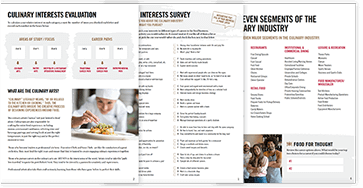
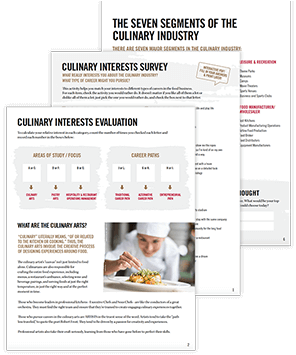

Come to Class Focused and Prepared
So much of success in school and career is arriving on time and ready to work. And “on time” doesn’t mean you step into the building at 9:00 am for a 9:00 am class. It means you’re ideally in your classroom wearing a clean uniform with your station set up before the class starts. It means your phone is off and put away, and you’re ready to listen with no distractions.
Practicing preparation in culinary school can serve you well throughout your career!
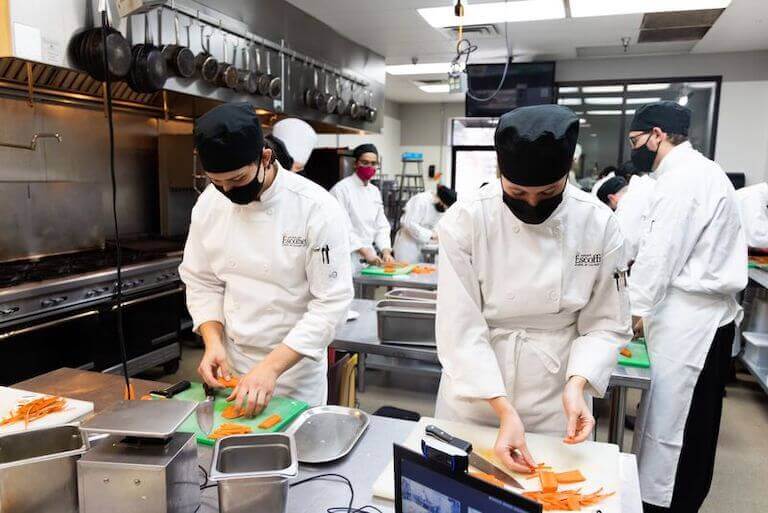
Take Notes
There’s a lot of focus on kitchen-specific tools in culinary school. Knives. Pots and pans. The kitchen scale. But the most valuable tool you have just might be a pen and notebook. Don’t rely on your memory to keep track of your Chef Instructor’s verbal instructions. Write them down!
Ask for Help
You’ll probably never have so many experienced cooks and chefs accessible for questions as you will during culinary school. Take advantage of it!
Ask for help if you’re unsure. If your dough isn’t coming together, don’t suffer in silence! Ask why. Don’t be ashamed of making mistakes. Error and correction are the best ways to learn.
“Making mistakes is how you learn. I tell students that it’s important that once you make the mistake, you learn from that and you never make it again, so you can continue growing and have more tools for success.”*
Emily Maddy, Escoffier Chef Instructor
You’re Ready to Meet the Challenge
Is culinary school hard? Yes. So are most things in life that are worth doing. But at Escoffier, our students have the support and resources they need to help them along the way.
And even after graduation, students can look forward to help through Career Services, which may provide resume writing assistance, interview preparation, and industry referrals.
Explore all of the programs available at Escoffier to find the one that’s best suited for your goals. And contact our Admissions Department to get answers to your questions about what you can expect in the classroom!
Want to learn more about culinary education? Try these articles next:
- How Long Does it Take to Finish Culinary School?
- Can You Become a Chef Without Going to Culinary School?
- What Are the Different Chef Certifications?
*This information may not reflect every student’s experience. Results and outcomes may be based on several factors such as geographical region or previous experience.
**Our Boulder, CO campus is the only accredited institution in the United States to offer both fully online diploma and degree programs nationwide with culinary classes and hands-on industry externships. We are accredited by ACCET – A Partnership for Quality. ACCET is listed by the U.S. Department of Education as a nationally recognized accrediting agency.

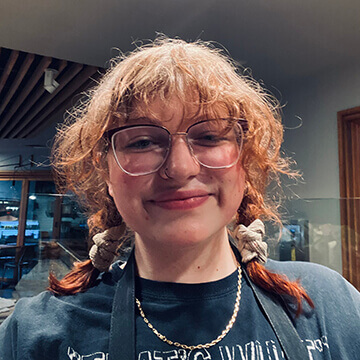 “Knowing that I would have an answer within 24 hours on a scary FAFSA question was so reassuring.”*
“Knowing that I would have an answer within 24 hours on a scary FAFSA question was so reassuring.”*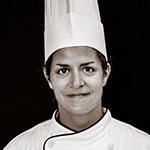 “Making mistakes is how you learn. I tell students that it’s important that once you make the mistake, you learn from that and you never make it again, so you can continue growing and have more tools for success.”*
“Making mistakes is how you learn. I tell students that it’s important that once you make the mistake, you learn from that and you never make it again, so you can continue growing and have more tools for success.”*